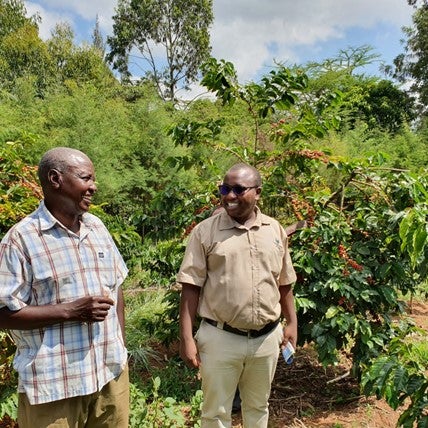From the Field
Monday, April 22, 2024
Building a Strong Supply Chain in Kenya
This time on our deep dive into sustainability at Sucafina, we’re speaking with Muhia Murigi, Sustainability Coordinator at KENYACOF (Sucafina in Kenya). Hear from Muhia about how KENYACOF has established impressive outreach programs with coffee farmers and built a strong supply chain that benefits farmers and roasters alike.

When did you join Sucafina?
Muhia Murigi: I joined Sucafina in January 2022 as a Farm Manager. I was tasked with supporting coffee estate farmers through field advisory on production, quality and certifications. I hold a BSc. Agribusiness Management & Trade and have 9 years of experience in coffee production. Now, I’m the Sustainability Coordinator and am in charge of a team implementing projects, supply chain certification and farmer engagement initiatives.…
What do you think are KENYACOF’s sustainability strengths?
MM: The greatest strength is that KENYACOF has is a skilled and well-organized field team. Our team is involved in the implementation of all sustainability initiatives in our partner farmer cooperative societies (FCSs) in key coffee growing regions. This team has created strong and long-lasting relationships with farmers who hold KENYACOF in high regard for our efforts to continuously support them in their production processes.
Another key strength is that KENYACOF constantly coordinates our sustainability initiatives with our business goals. We understand that sustainability initiatives are a major tool to establish long-standing relationships within our supply chain and become a buyer of choice for our farmers. This is in line with the sustainability goal of Investing in Farmers and has led to farmers who deeply appreciate KENYACOF as a reliable and dependable partner.
What main areas are you working on now?
MM: We are currently implementing a project on carbon reduction and low carbon farming that’s financed in collaboration with Nestle. From a baseline survey, we noticed most emissions happen at farm level, so we decided to directly intervene holistically within these supply chains.
In this project, we are setting up nurseries in 16 cooperatives societies to produce over 400,000 tree seedlings to be distributed to over 20,000 coffee farmers in the coffee growing regions. These distributed tree seedlings will be used to reforest coffee farms and create agroforestry systems. The initiative is training of farmers on regenerative agriculture practices, which is one of our five IMPACT areas of focus. They will positively impact yield and help prevent deforestation by increasing productivity and income from existing farms. The planted trees will also help sequester carbon and reduce the carbon footprint in the supply chain.
In tandem to expanding agroforestry, we’re helping farmers increase their yields through improved soil health. We’re building a revolving fund to help farmers purchase lime and biofertilizers and soil sampling. Loans are allocated and once they are repaid, the money is then loaned to another farmer so that it’s always making an impact. We are supporting correct input application by analyzing farm soils with modern soil scanners and qualified soil scientists. These analysis help KENYACOF distribute inputs where we can best maximize soil health and productivity.
Additionally, we are investing in trainings for farmers in low carbon technologies and waste management. So far, we have installed biodigesters in over 80 households. These biodigesters take animal waste, farm scraps and excess food and ferment them to create gas biofuel for cooking and a nutrient-rich biofertilizer for farming. Thanks to the biofuel, this initiative is helping mitigate issues of deforestation caused by firewood use for energy by generating a clean source of energy for home use from domestic & animal waste.
The other activity that we are working on is increasing women and youth participation in coffee production and community engagement through tailored initiatives that incentivizes and encourages women and youth participation in coffee production. We’re aiming to help amplify the role women in coffee production.
What do you hope to work on in the future?
MM: We hope to work on a fully sustainable, data-driven farmer financing model that will enable farmers to access financing for their operations and address one of the major obstacles to improved farm production. Full traceability in the supply chain will also help bring us in line with recent EUDR laws.
Simultaneously, we hope to build a more data-driven approach to creating climate & income resilience programs for farmers. This will enable us to identify the programs that work and learn from the ones that don’t.
What are your goals for the next 1 to 5 years for sustainability at KENYACOF?
MM: My main goals are around increasing our responsible sourced supply chain by enrolling more farmers onto certification programs like IMPACT. Given the impending legislative change, we’re also focusing on supporting our farmers so they can meet EUDR compliance. We’re supporting data collection and digital registration of farmers and developing a sustainable operational & monitoring strategy. This will mean expanding digitized farmer interactions to enhance verifications on sustainable practices adoption, farmer support activities and the impact of all our initiatives. In sum, we’re working on building a fully traceable and responsibly sourced supply chain in collaboration with the trade team.
Is there anything else you would like roasters to know?
MM: I would like to appreciate the efforts from the roasters who have partnered with KENYACOF to support farmers in sustainability initiatives towards responsibly sourced & sustainable coffee production. I’d also like to invite more roasters who buy Kenyan coffees to get involved in our programs. Every effort & initiative counts!
For those interested in getting involved with KENYACOF and the farmers in the their supply chain, KENYACOF has a number of wayways to get involved to help farmers mitigate climate change challenges, improve livelihoods and more. Get in touch with your trader to learn more about how you can connect with farmers and a establish a relationship that supports sustainable coffee production.